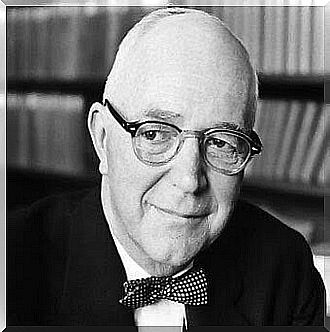Gordon Allport was an American psychologist who made history for laying the foundations of personality psychology. His personality theory was considered one of the first humanist theories for his conception of the human being as an autonomous being with free will. Allport argued that people are not solely motivated by instincts and impulses, nor are they governed by the past.
His work, moreover, is narrated in a very didactic way, being very pleasant, interesting and attractive to the general public. Without a doubt, he is an author that deserves to be read not only by specialists in psychology, but also by anyone wishing to quench their thirst for knowledge and concerns related to the sphere of psychology.
In addition to his personality theory, Gordon Allport contributed very important information to psychology in the fields of motivation, prejudice, and the religion of individuals. As such, his legacy is very broad and he has become a really interesting figure in the field of psychology. Throughout this article, we will reveal some of the particularities and contributions of this psychologist.
Gordon Allport’s early life
Gordon Allport was born in Indiana in 1897, but his family moved to Ohio when Gordon was still a child. His father was a doctor, but he worked at home. As a result, Gordon Allport and his brothers were involved in the medical world from childhood. This approach to medicine aroused his interest in studies and, in particular, in psychology.
However, his first steps in academic life were not linked to medicine or psychology. Allport majored in economics and philosophy, although he has always shown a keen interest in social psychology. Allport had a very quiet, peaceful and undisturbed life.
Finally, he graduated as a psychologist at Harvard and, after that period, took a trip to Europe, more specifically to Vienna. This trip was one of the most significant events of his life, as it was when he approached Sigmund Freud, although this meeting does not seem to have resulted in great admiration for the father of psychoanalysis, but the opposite. Gordon Allport, like many other psychologists who formed the humanist school, found Freud’s theories rather limiting.

Your job
When he returned from Europe, he began his work as a professor of psychology at Harvard University, where he remained until his death. During his stay at the institution, he was part of several committees and taught courses that were truly innovative for his time. He was editor, faculty member, and, in 1939, elected president of the American Psychological Association.
He has published several books in which his main researches are gathered. Among them, Basic Considerations for a Psychology of Personality stand out , one of Allport’s most recognized and applauded works. During his lifetime, he received several awards in recognition of his work and contributions to the field of psychology. The American Psychological Association awarded him the Outstanding Scientific Contribution Award, a hotly contested honor in the profession.
Gordon Allport strongly emphasized the motivations and conscious thoughts of individuals, eliciting a great deal of interest in personality development. Allport tried to strike a balance between the main currents of the moment. Behaviorism seemed incomplete, superficial, while psychoanalysis was very complex. As a result of the meeting with Freud, his interest in developing his own theory was consolidated.
Contribution to Psychology
Gordon Allport is known to be very influential in many areas of psychology, especially his theory of personality traits. This theory states that each human being has hundreds of traits. He classified 4,500 words that define a person and grouped them into three levels:
- Cardinal trait : is the dominant trait of a person and is what shapes the individual’s identity, emotions and behaviors.
- Central feature: these are main features, although they are not dominant. They are inherent to most people and lay the foundation for their personality and actions.
- Secondary trait : these are personal traits, particular to each individual. Often, they only reveal themselves confidentially and under certain conditions.

Gordon Allport’s legacy
In addition to his Personality Traits Theory, he identified genotypes and phenotypes; in other words, the internal and external conditions that motivate a person’s behavior. In his work Personality: a psychological interpretation (1937), he defines personality as: “the dynamic organization within the individual of those psychophysical systems that determine his adaptation to the environment”.
Furthermore, he emphasized that this personality is different in each individual. Allport was also interested in the nature of people’s will, motivation and determination. He highlighted the importance of learning, behaviors and thoughts of an individual, which are the product of a whole life story. That is, what a given individual thinks at a time is the result of his past, but also of his present.
Gordon Allport promoted the “interdisciplinary movement” at Harvard University, out of which emerged the social science department headed by Talcott Parsons. In addition to his contributions, he also criticized Freud’s psychoanalysis and radical behaviorism. In turn, he developed the concept of propium , that is, the part of the personality that seems to play an intimate and central role for the person.
It also addressed other issues such as prejudice and religion. Allport carried out an exhaustive analysis of the issue of prejudice, exemplifying and delving into the discrimination that Jews and African-Americans suffered. All of this is brought together in one of his most recognized works: The Nature of Prejudice.
Finally, after a life dedicated to studies, Allport passed away on October 9, 1967. After his death, he left an unmistakable legacy in the field of psychology. Considered one of the pioneers of humanistic psychology, Allport is, without a doubt, an important figure of the 20th century.
 rancha.xyz Be free to choose their own route to self-knowledge, health and balance of body and soul.
rancha.xyz Be free to choose their own route to self-knowledge, health and balance of body and soul.




